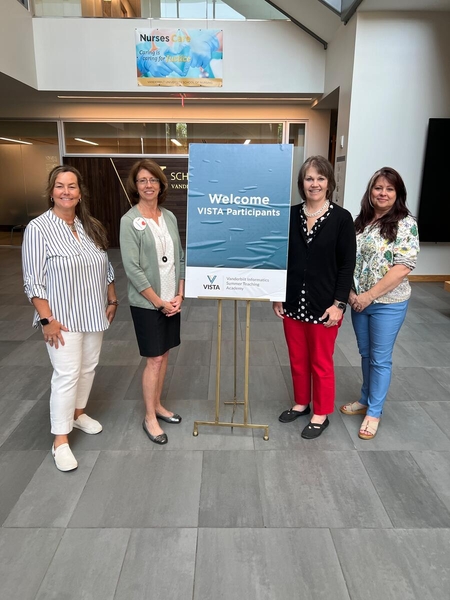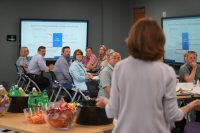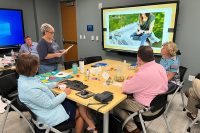By Tatum Lyles Flick
VUSN Communications Specialist

Nursing educators from across the United States traveled to Nashville this summer to attend the Vanderbilt University School of Nursing’s three-day, intensive Vanderbilt Informatics Summer Teaching Academy (VISTA). The workshop was created to help nursing schools incorporate informatics knowledge in curriculum required by the 2021 American Association of Colleges of Nursing (AACN) Essential Core Competencies for Professional Nursing Education.
Three Vanderbilt nursing informatics experts—Senior Associate Dean for Nursing Informatics Patricia Sengstack, DNP, FAAN, FACMI; Director of Informatics Innovation Kelly Aldrich, DNP, FHIMSS; and Director of Nursing Informatics Specialty Brenda Kulhanek, PhD—developed, implemented and evaluated VISTA to teach nursing educators how to integrate informatics content related to data, information and technology into their nursing programs and accommodate the new requirements. The VISTA team created and gave attendees a resource book with a table of clearly defined requirements and ideas how to teach each concept.

“Nurse faculty across the nation have to embed these competencies into their curricula to satisfy AACN requirements,” Sengstack explained. “When accreditors inspect a program, they need to see that the curricula adhere to and cover the required competencies; however, many nursing faculty have no informatics background.”
VUSN is a recognized leader in informatics, having taught the subject since the 1990s, incorporating it into its MSN, DNP and PhD programs. Earlier this year, Sengstack, Aldrich and Kulhanek used their experience to review the requirements, determine what information attendees needed and devise ways educators could teach students multiple competencies through a variety of hands-on activities. VISTA participants felt their efforts were successful, some going so far as to refer to the resource book as “gold.”
“The program has been wonderful,” said Randall Johnson, BSN program director at the University of Tennessee Health Science Center in Memphis. “The most exciting thing is getting into the new essentials so that we can make sure that we’re covering those competencies for students.” Johnson said that though his school has addressed many of the competencies, and though they thread informatics into their current curriculum, they want to increase the amount of information they’re able to share with students.

“I was interested in learning how to thread high-quality informatics activities into the prelicensure and graduate curriculum,” said Brittany Hay, FNP and A-G Primary Care concentration director at the University of South Florida College of Nursing in Tampa, who decided to attend the program as soon as she saw it was available. “The design of the offering is very user-friendly. They’re providing a lot of practical tools that I can take back, adapt to our program and integrate meaningful informatics content.”
Conference leaders and attendees used case examples, breakout groups and activities to come up with teaching strategies, content and ways to measure success.
“I think it was kind of mind-blowing for the participants, that they could meet all sorts of sub-competencies with one particular assignment or lesson,” Kulhanek said, explaining that though addressing all of the competencies seemed daunting at first, the VISTA leaders came up with creative solutions.
On day one, attendees learned how to define informatics and how it can be used to improve the field of nursing. On day two, they learned about technology tools, knowledge generation, health IT, safety and regulations. On day three, they learned how to use design thinking and how to apply it to come up with new ideas and share them with others.
“On day three, I provided an overview of the current state of innovation, then we outlined the Essentials through the whole document,” Aldrich said. “We challenged attendees to think of an idea and use theories of design thinking to present it to us. They were really energized and enjoyed the chance for creativity.”

Throughout the course, attendees enjoyed interactive learning activities, which helped them understand how to teach their students the required information about informatics while also incorporating information from other subjects. They also built connections with colleagues from across the country, with whom they plan stay in contact to share ideas and celebrate successes.
“I think our activities helped to reinforce their understanding,” Kulhanek said. “I felt that it was very satisfying to see everybody’s light bulbs go off and to see them work together so well.”
The VISTA team enjoyed knowing they are helping others address a requirement, but they were even more enthusiastic about helping others realize how exciting and helpful informatics can be.
“It felt incredibly rewarding to know that we have imparted informatics knowledge into a community that either didn’t have it or where their knowledge was limited,” Sengstack said. “They’re going to go forth and spread the word on what informatics is. We now have 28 people from universities across the country who can now impart some of that informatics knowledge across their curriculum and who can help their students understand it and keep it growing from there.”

Participants reported that they found the information productive and beneficial. One participant wrote in evaluation, “I thoroughly enjoyed this conference! All faculty were engaging and passionate about the subject and provided a hands-on learning environment. I came away from the workshop empowered and ready to implement curricular changes to strengthen our informatics content.”
Not only did the course teach attendees about informatics, it helped them feel empowered to confidently share their knowledge and ideas.
“In nursing we need people to know how to communicate ideas to create change,” Aldrich said. “We wanted to help faculty build and apply those skills, then teach them to their students. One day, we could have this whole group of nursing students who are inspired to have a voice, and empowered to drive change.”